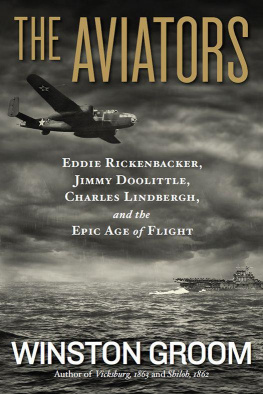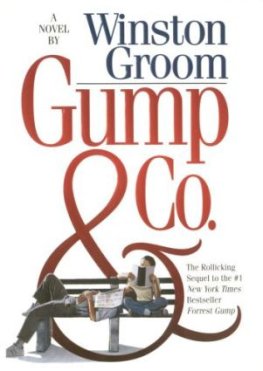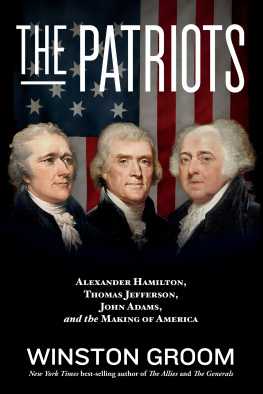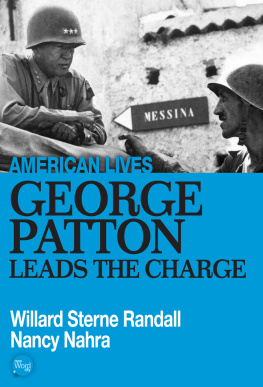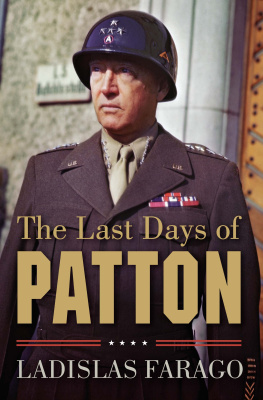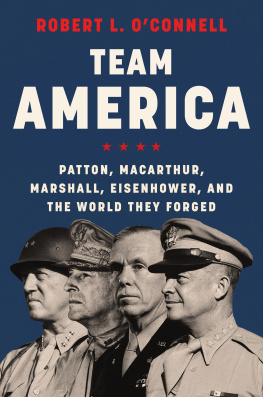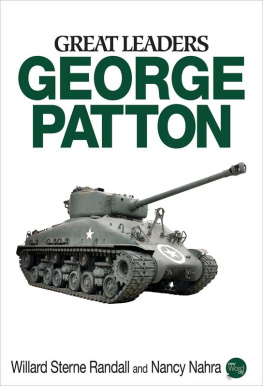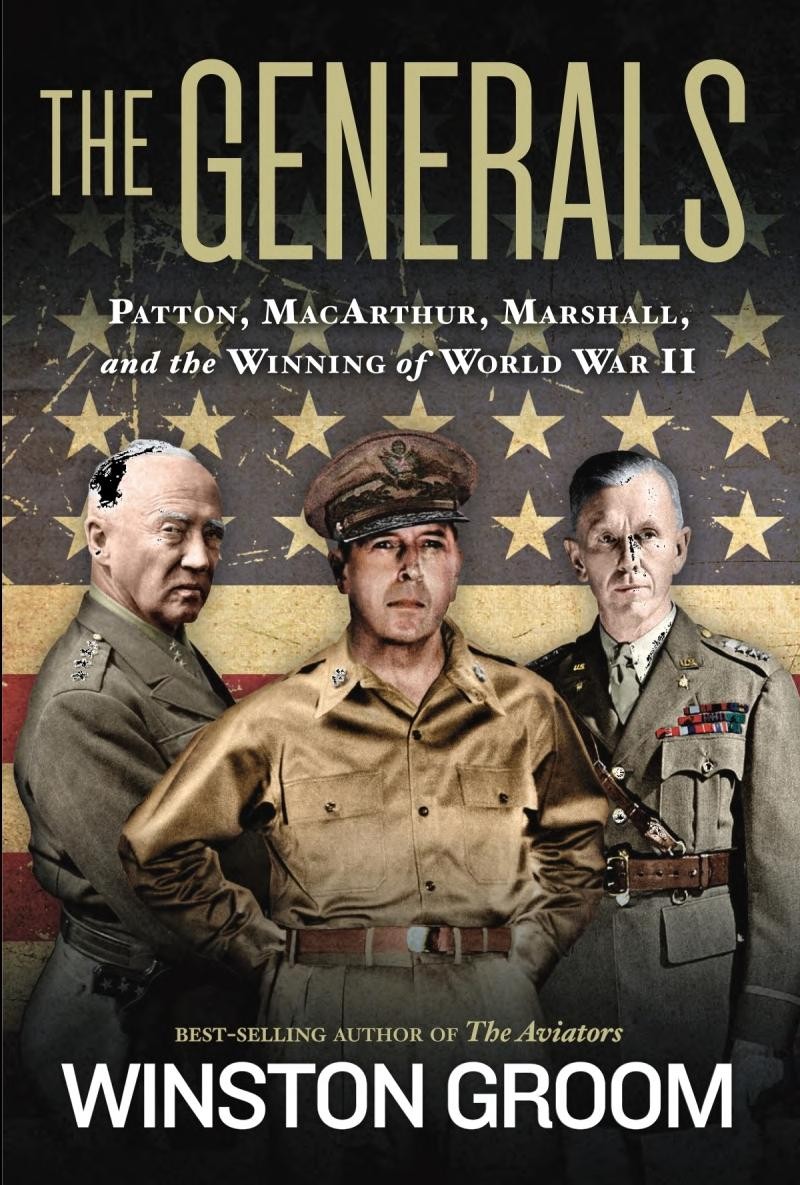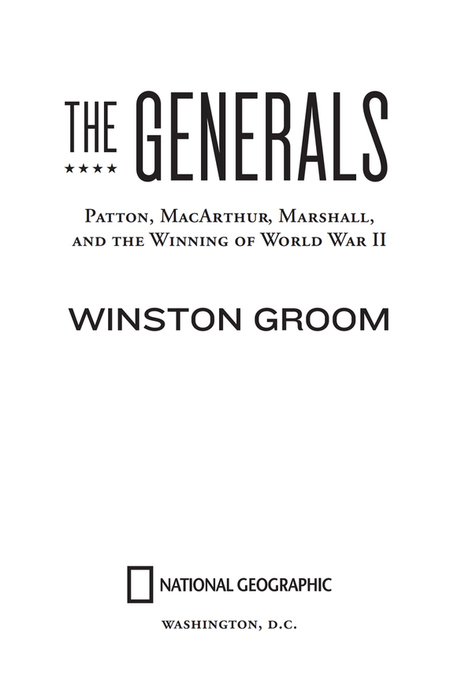ALSO BY WINSTON GROOM
N ONFICTION
Conversations with the Enemy (1982, with Duncan Spencer)
Shrouds of Glory (1995)
The Crimson Tide (2002)
A Storm in Flanders (2002)
1942 (2004)
Patriotic Fire (2006)
Vicksburg, 1863 (2009)
Kearnys March (2011)
Shiloh, 1862 (2012)
The Aviators (2013)
F ICTION
Better Times Than These (1978)
As Summers Die (1980)
Only (1984)
Forrest Gump (1986)
Gone the Sun (1988)
Gump and Co. (1995)
Such a Pretty, Pretty Girl (1998)
Published by the National Geographic Society
1145 17th Street NW Washington, DC 20036
Copyright 2015 Winston Groom. All rights reserved. Reproduction of the whole or any part of the contents without written permission from the publisher is prohibited.
Library of Congress Cataloging-in-Publication Data
Groom, Winston, 1944
The generals : Patton, MacArthur, Marshall, and the winning of World War II / Winston Groom. 1st edition.
pages cm
Includes bibliographical references.
ISBN 978-1-4262-1549-0 (hardcover : alk. paper)
1. World War, 1939-1945United StatesBiography. 2. Patton, George S. (George Smith), 1885-1945. 3. MacArthur, Douglas, 1880-1964. 4. Marshall, George C. (George Catlett), 1880-1959. 5. GeneralsUnited StatesBiography. I. Title. II. Title: Patton, MacArthur, Marshall, and the winning of World War II.
D736.G69 2015
940.5412730922dc23
2015021562

The National Geographic Society is one of the worlds largest nonprofit scientific and educational organizations. Its mission is to inspire people to care about the planet. Founded in 1888, the Society is member supported and offers a community for members to get closer to explorers, connect with other members, and help make a difference. The Society reaches more than 450 million people worldwide each month through National Geographic and other magazines; National Geographic Channel; television documentaries; music; radio; films; books; DVDs; maps; exhibitions; live events; school publishing programs; interactive media; and merchandise. National Geographic has funded more than 10,000 scientific research, conservation, and exploration projects and supports an education program promoting geographic literacy. For more information, visit www.nationalgeographic.com.
National Geographic Society
1145 17th Street NW
Washington, DC 20036-4688 USA
Your purchase supports our nonprofit work and makes you part of our global community. Thank you for sharing our belief in the power of science, exploration, and storytelling to change the world. To activate your member benefits, complete your free membership profile at natgeo.com/joinnow.
For information about special discounts for bulk purchases, please contact National Geographic Books Special Sales:
For rights or permissions inquiries, please contact National Geographic Books Subsidiary Rights:
Interior design: Melissa Farris / Katie Olsen
eBook ISBN: 978-1-4262-1550-6
v3.1
To Susan Helmsing,
who has lived with this book
nearly as long as I have, with all love.
So as through a glass and darkly
The age long strife I see
Where I fought in many guises
Many namesbut always me.

George S. Patton Jr.,
a firm believer in reincarnation
CONTENTS


AUTHORS NOTE
U .S. Army generals do not wear insignia of the division in which they serve, such as infantry, armor, artillery, signal corps, and so on. They are supposed to be masters of all the branchesbranch immaterial, as the saying goes.
There are five ranks for generals in the U.S. Army. A single-star brigadier general, in theory, leads a brigade composed of men in squads of a dozen or more. These are arranged with four squads to a platoon, which come four platoons to a companyfour to as many as eight of which make up a battalionseveral or more of which form a brigade of four thousand to six thousand men. A two-star major general commands a division, which is composed of several brigades. A three-star lieutenant general commands an army corps, which is composed of several divisions. A four-star general of the army commands an army consisting of several corps, and a five-star general of the armies commands more than one army, such as General Dwight D. Eisenhower did in the European theater in World War II.
This sounds cut-and-dried, but it isnt, because of the way ranks are made; however, as a rule its the way its supposed to work.

PREFACE
G enerals are a breed apart in the U.S. military. Its not simply a matter of higher rank; to wear the stars of a general in the American army is to belong to one of the most exclusive clubs on earth. Throughout the pages of history generals in war have often passed into outsize legend. Americans have seen fit to elect twelve generals to the U.S. presidency, but even before there was a United States of America generals ruled the earth.
Take for example Alexander the Great, who was born in 356 B.C . in Macedonia (ancient Greece). He was tutored as a youth by Aristotle and educated in the manner of all royal Macedonian boys to read, ride, fight, hunt, contemplate, paint, and play the harp. When he was ten, according to the Macedonian philosopher and historian Plutarch, Alexanders father informed him, My boy, you must find a kingdom big enough for your ambitions. Macedon is too small for you.
At the age of twenty, after the assassination of his father, he succeeded to the throne and took command of the Macedonian army. Then he set out to conquer the world.
With a force of 6,000 cavalry and 50,000 foot soldiers, and a fleet of 120 ships crewed by 40,000 sailors, in 334 B.C . Alexander crossed the Hellespont into Asia, which was then ruled by the Persian Empire of King Darius III. Once on Asian soil, he threw a spear into the ground and claimed it for himself as a gift from the gods.
After liberating half a dozen cities along the Ionian coast, Alexander marched inland to Phrygia in Anatolia (Turkey) where he came upon the famous Gordian Knot that had been tied by the legendary King Gordiaswho had decreed that anyone able to undo the knot would become the king of Asia. Alexander hacked the thing apart with his sword and marched on to Syria where he encountered Darius and his vast army.
Slipping through the Pass of Jonah, Alexander placed his men in a terrain of mountains and rivers that gave him a tactical advantage over Dariuss vastly superior forces, said to number 100,000. After Dariuss cavalry broke itself on a stout Greek phalanx, Alexander personally led a charge that frightened King Darius to the extent that he ran off leaving his wife and entire family to the tender mercies of the Greeks. His army likewise fled, giving Alexander possession of Syria, where, we are told, he massacred the men of military age and sold the women into slavery.


